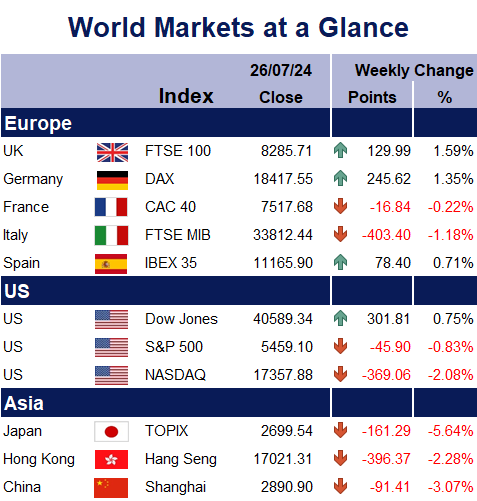In contrast, UK markets ended the week on a high note, with the FTSE 100 rising by 1.59%. Data revealed that the UK’s private sector has expanded for nine consecutive months, remaining above the 50-point threshold. July saw new business growth reach its highest level in over a year, driven by the fastest manufacturing growth in two years and the strongest inflow of new orders since April 2023. The Composite PMI increased to 52.7 in July from 52.3 in May, slightly surpassing expectations.
The business survey presents a positive outlook, with companies in both manufacturing and services expressing optimism about the future. This performance stands out against the euro zone, where the same survey fell to 50.1 from 50.9, missing all forecasts.
US economic data brought some positive news later in the week in the form of Q2 US GDP which expanded at an annual rate of 2.8%, firmly above expectations of just 2% and the 1.4% growth recorded in Q1. Investors were also reassured by the Federal Reserve’s critical PCE Price Index released on Friday. The Fed’s preferred measure of inflation, rose by 0.2% on month in June 2024, surpassing market expectations of a 0.1% increase. On an annual basis, core PCE inflation remained steady at 2.6% in June, unchanged from the previous month. This data suggests a resilient economy with steady inflation, potentially boosting market confidence and influencing the Federal Reserve’s future monetary policy decisions.
Next week the Bank of Japan will kick off the week’s central bank announcements. While no major policy shifts are anticipated, markets will be keenly watching for any signals of a hike in the future.
Midweek, all eyes will turn to the Federal Reserve. Recent economic data has painted a mixed picture, making the Fed’s decision particularly unpredictable. As usual investors will scrutinise Chair Jerome Powell’s remarks for insights into the Fed’s future policy trajectory.
The week culminates with the Bank of England’s interest rate decision on Thursday 1st August. The markets are currently split, with analysts evenly divided on whether the central bank will reduce rates by 0.25% from 5.25% to 5% now or hold off until September. Such a move would alleviate pressure on borrowers, providing much-needed relief to households and businesses.
Complementing the central bank announcements, Eurozone Q2 GDP and inflation data, as well as the release of the US unemployment rate and non-farm payrolls figures.
Kate Mimnagh, Portfolio Economist



